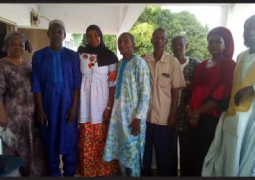Gambians and Senegalese living in Portugal have commended the Portuguese government for ‘‘working very hard trying to put the economy back on its feet’’ and allowing them the opportunity to ‘‘live a normal life in the country’’, despite reports of high unemployment.
It is vital to note that there are less Senegambians in Portugal compared to other Africans, who mainly migrated from its former colonies such as Cape Verde, Guinea Bissau, Mozambique, Soa Tome and Principe and Angola.
Nonetheless, several hundred Africans are currently living in the country; however, due to the fact that there is ‘‘limited official statistics’’ about race and ethnicity, it is very difficult for The Point to be precise about the numbers involved.
But the Portuguese are not unfamiliar with Senegambians. Afonso Gomes, a second generation African Portuguese whose parents came to the country decades ago, and now working with a cultural firm, spoke to this correspondent in the capital city of Lisbon.
‘‘Senegambians are very important here taking into consideration the history of Portugal...They have all the opportunities, and should not be left behind,’’ he said.
Gomes’s argument carries weight because Alvise Cadamosto, who was an Italian slave trader and was ‘‘hired’’ by the Portuguese Prince named Henry the Navigator undertook journeys to West Africa, including The Gambia in 1455.
Other countries he later ‘‘discovered’’ with his team included the Geba River which is now Guinea Bissau.
But the so-called ‘‘Jus sanguinis’’ ensure that Africans maintain their own nationalities, which was based on the principle of ‘‘jus soli’’. However, it was eventually amended in 1981.
Such drastic change prevented the possibility of naturalisation, until about ten years ago when it was slightly amended.
Nevertheless, it is still difficult to know how many Senegambians have Portuguese nationality.
According to reports, the country is in its ‘‘worst economic’’ situation, and had even requested ‘‘78bn-euros bailout’’ from international lenders.
However, in order to meet the criteria set out, the government had no other option but to ‘‘increase taxes and cut pay’’, resulting in high unemployment rates.
Both established residents and new arrivals unanimously told The Point that ‘‘it has never been like this’’.
Also, recently, thousands of Portuguese emigrated from the country, interestingly some of them to their former African colonies.
Momodou Lamin Jagana, a Gambian national resident in the country for over five years, said even though he lost his job recently, he is ‘‘optimistic’’ about gaining employment in the near future.
‘‘Yes, times are hard, but I am positive that I can gain employment soon... I speak Portuguese, and currently contacting employment agencies,’’ he said.
Senegalese national, Coumba Camara, selling African costumes, also stressed that since she started her business several years ago, ‘‘there has been some ups and downs, but recent events are harder than ever before.’’
But, she added, ‘‘people are nice and welcoming, and there is encouragement.’’
Construction, domestic and care jobs popular for such migrants are ‘‘now gone or hit very hard by the current crises’’ and those without ‘‘proper documents or who overstayed their visas’’ are even more vulnerable.
Despite the odds, the country was recently selected as the ‘‘Best Value Destination’’ by Rough Guide and is known for its attractions, including culture, hospitality, gastronomy, beaches and landscapes. This can be seen in both entry and exit points of the country.
As the country heads to the polls, President Anibal Cavaco Silva admitted that the country was facing a ‘‘crucial moment’’.
But for the Senegambians, they are hoping and praying that regardless of the ‘‘resentment’’ from some sections of the society about migrants and foreigners, such hospitality and warmness will continue.


